American think tank Pew Research Center released some fascinating findings last week (November 18) that looked at where people around the world find meaning in life.
Having surveyed nearly 19,000 adults across 17 developed nations earlier this year, here’s a snapshot of what participants picked, from the most cited to the least.
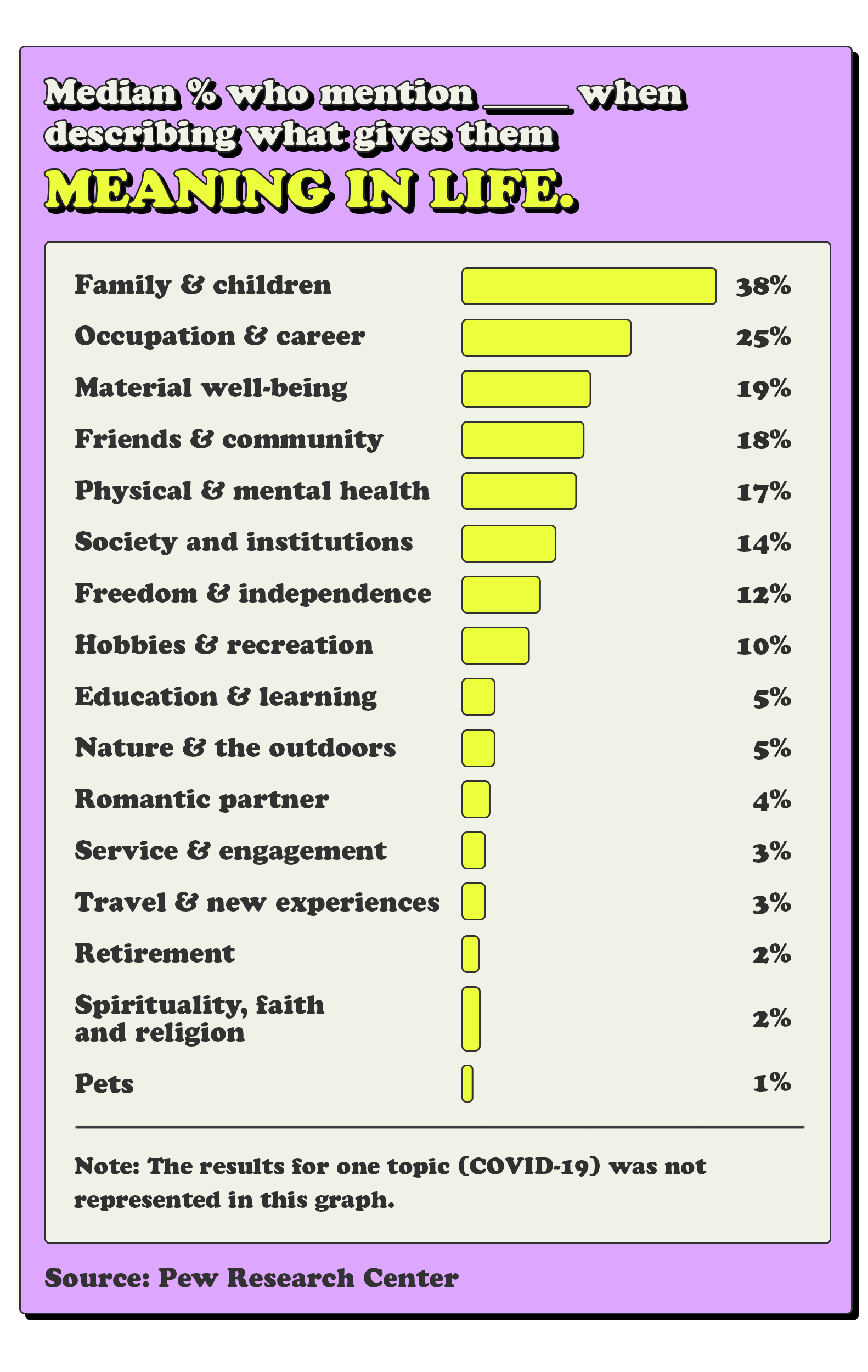
Before we take a look at some of the standout figures from around the world, you might be wondering where our little island stands among the findings?
Here’s the summary by Pew Research Center for a few broad strokes.
- In Singapore, 3 in 10 mention family as part of the meaning of life.
- About a quarter refer to their jobs (occupation), the area they live in (society) or their standard of living (material well-being).
- Other topics, such as relationships with friends or recreational activities, are mentioned in no more than a tenth of responses.
- Singapore is one of few countries where society comes up among the top 3 sources of meaning, with respondents particularly highlighting public safety, security and the government’s successful handling of the COVID-19 pandemic.
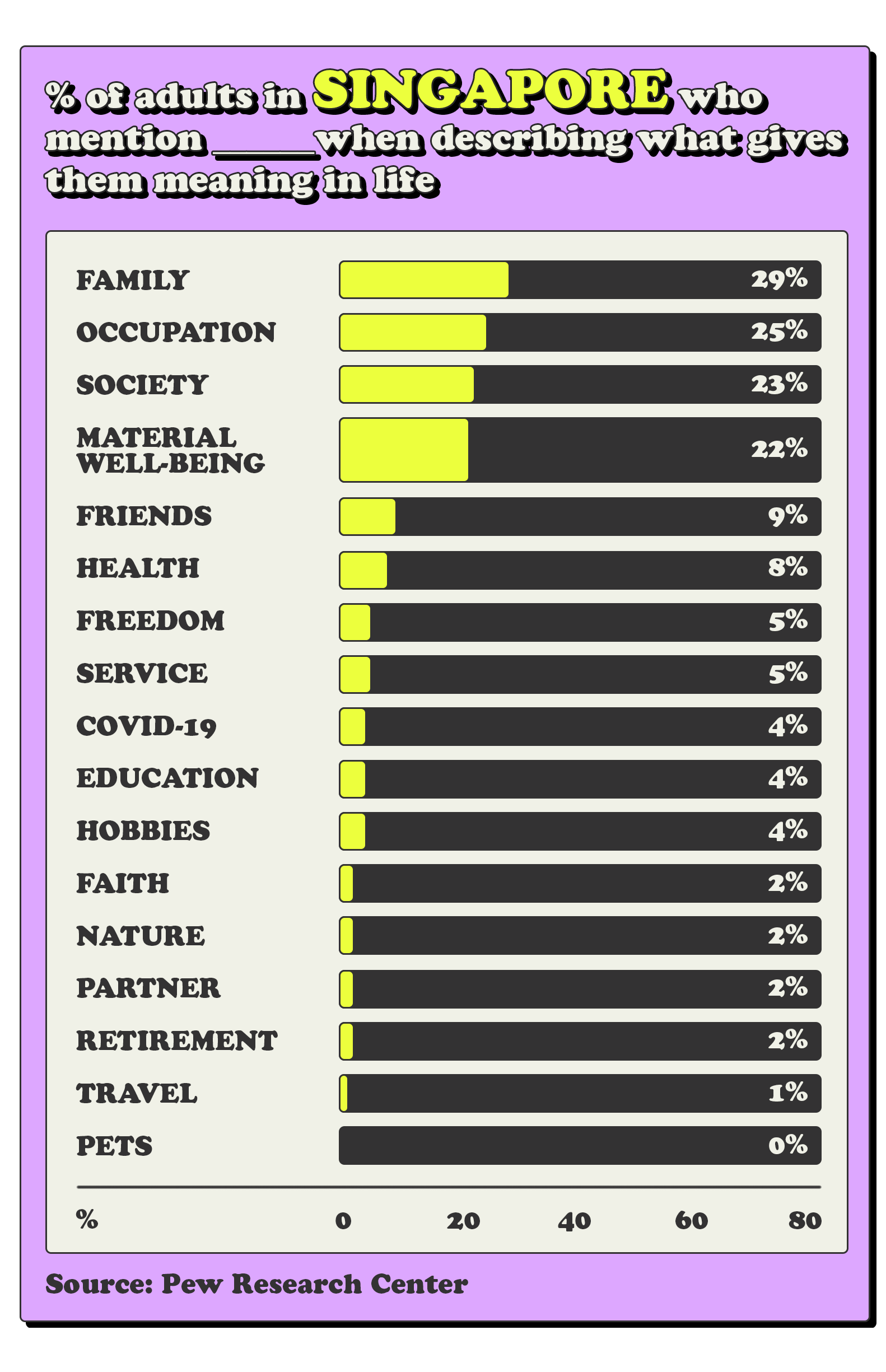
FOCUS OFF THE FAMILY?
It comes as little surprise that family is the top source of meaning for 14 of the 17 advanced economies surveyed. After all, aside from the element of carbon, it’s probably the next most basic building block of life as we know it.
But I was a little surprised at the relatively low percentage for “family” in Singapore — 29%.
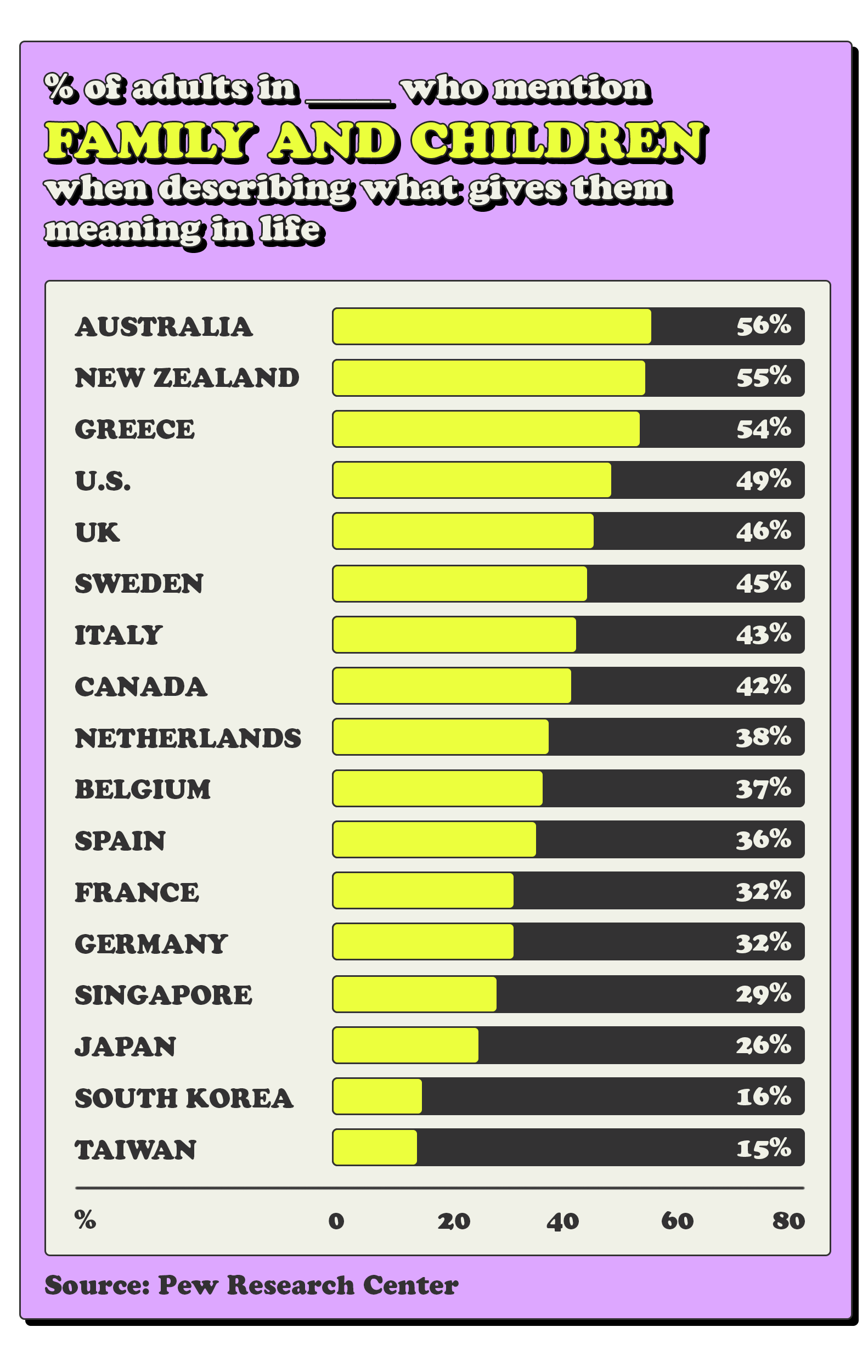
Yes, it was the most common answer among adults here by far, but the sample tells us that only 3 in 10 in Singapore view family as the source of meaning for their lives.
That’s kind of strange, personally, given how much emphasis was placed on family while I was growing up.
I’m no statistician by any means, but I wonder if, in our country at least, changing perceptions of value when it comes to family might account for the historic low in our total fertility rate last year.
When it comes to how much meaning is derived from family, the Asian countries are also right at the bottom of the list — Singapore is only higher than three economies: Japan (26%), South Korea (16%) and Taiwan (15%).
MORE THAN JUST A JOB
Similar to the respondents in many other countries, occupation was ranked 2nd — 25% of Singaporean adults polled said that work is what gives them meaning in life.
Interestingly, elsewhere in the world, an occupation is what gives Italians (43%) and Spaniards (40%) their meaning in life. These 2 countries had the highest percentage of adults who picked work.
When you look at what else they value as bringing meaning into their lives, it is possible that they see work as a passion.
It’s probably quite unlike what your average South Korean thinks of work.
Just 6% say employment is what gives them meaning in life, which might suggest work is merely a means to the most-prized end of material wealth (19%) — the top-ranking category for the country’s respondents.
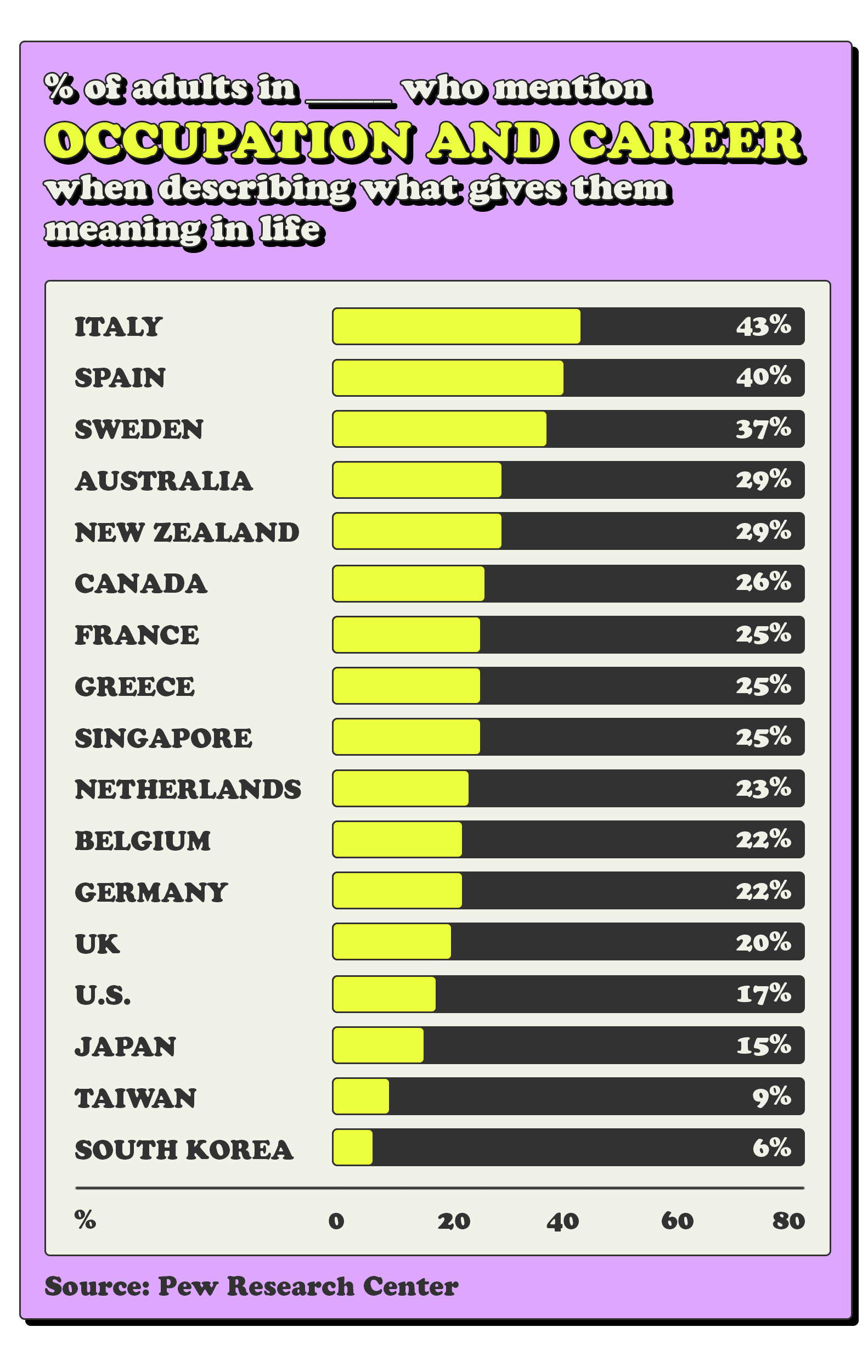
For the record, I’m not anti-work. It’s good to be productive and contribute to our land.
Considering that God was the first to work, artfully creating for six days before resting on the seventh, I think it is especially good to find meaning in work if the motives are noble.
“The LORD God took the man and put him in the garden of Eden to work it and keep it.” (Genesis 2:15 ESV)
Productive work is thus part of our original design and a means to an end.
But we often muddy the end, thinking the fruit is simply leisure or buying more stuff, when it is actually God’s glory and rest in Him.
THE SMALL ROLE OF FAITH
What stood out to me is how low faith scored across the 17 developed countries.
“The US stands apart from other societies surveyed for the relative emphasis placed on faith: Whereas it is never a top 10 source of meaning in any of the other 16 publics surveyed, in the US it ranks fifth,” states the report.
Here’s how Pew Research Center defined faith:
“Spirituality, faith and religion” includes mentions of the importance of religious faith, one’s own relationship with God, religious activities like attending church and praying, or more general feelings of spirituality and connectedness.
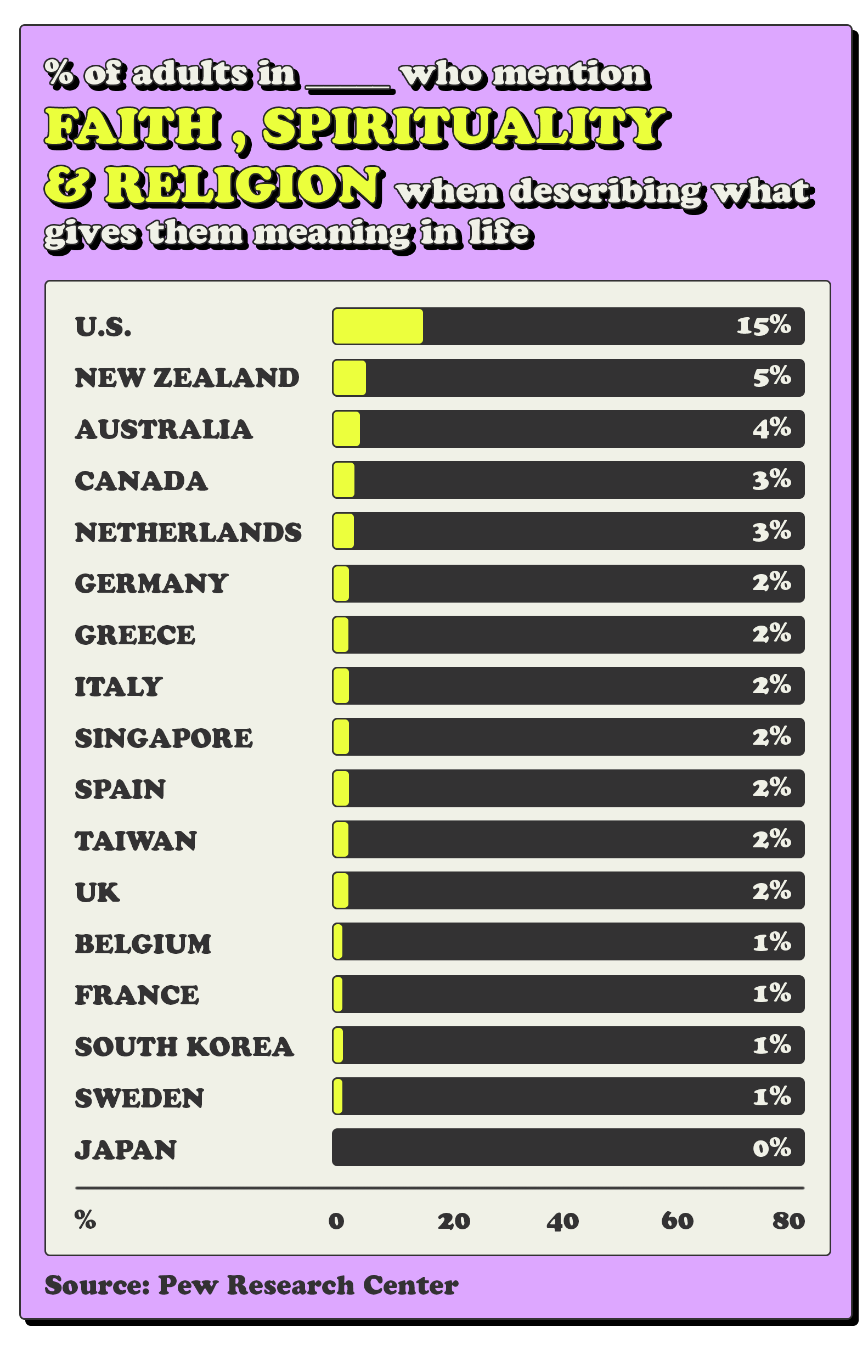
I wish faith scored higher across the board because I believe “one’s own relationship with God” is the true source from which divine purpose flows into our passions.
I’ve been cautious not to assert that any one choice is “better” than another in the course of this article because I do think there’s plenty of meaning to be found in each one.
But when you have a relationship with God, you come to view every one of these choices differently. Each one has potential for meaning and purpose through what God is doing in your whole life.
We’ll find meaning in life through family and friendships, for example, as we receive God’s love in them. Or His blessings to us in terms of health or wealth. His purpose for our lives guides how we work and contribute to society.
Lastly, as I was chewing over these numbers with my wife, she agreed with my assessment about faith, sharing that what I said reminded her of a model she had learnt from Pastor Benny Ho from Faith Community Church years ago.
He pointed out that people normally see life and our priorities in terms of a pie chart. Because it’s a pie chart, we’ve got to carve out certain amounts of time and energy for different things like God, family, work, school, etc.
But Pastor Benny shared that this is a wrong way to look at life. We should see life as a pie chart with a circle in the middle, with God right at the centre.
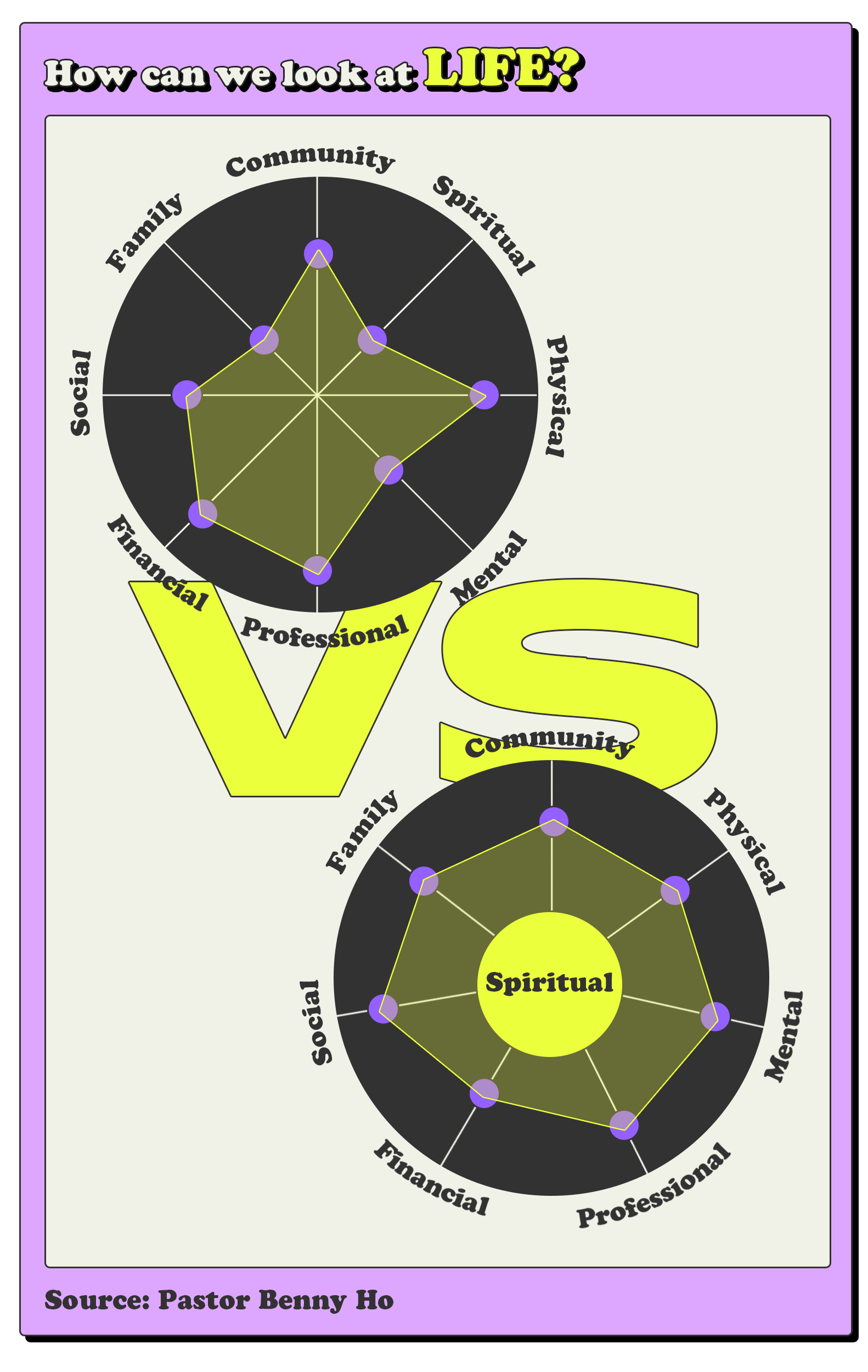
All of our life’s priorities flow out from that inner circle, from our inner life that’s centred on God.
As a result, what we do with our lives — whether it’s work, relationships or family — they all have a foundation, a common purpose, which stems from walking with God.
Pretty handy, huh? I think that’s how I want to look at things.
At the end of the day, one thing the dataset doesn’t paint is this truth: All of these factors were never meant to be the be-all and end-all.
They are but avenues for expressions of God’s character in a life that’s built upon on Him.
Knowing God should profoundly transform everything we experience and do.
- Among all aspects of life listed, which do you derive the most meaning from?
- What do you think about the concept of faith taking a central role in our life and giving meaning to all that we do?
- What do you think is the point of us being here on earth?









